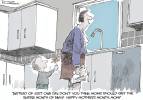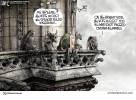With motivation and moxie, and help from the recession, entrepreneurs go into business

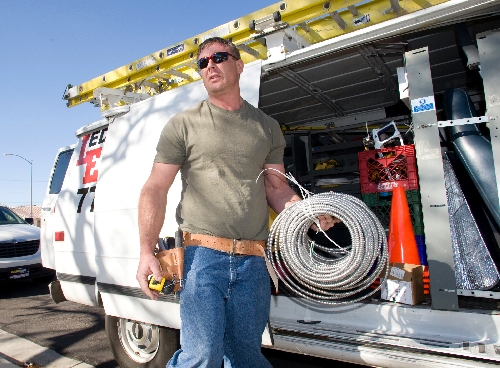
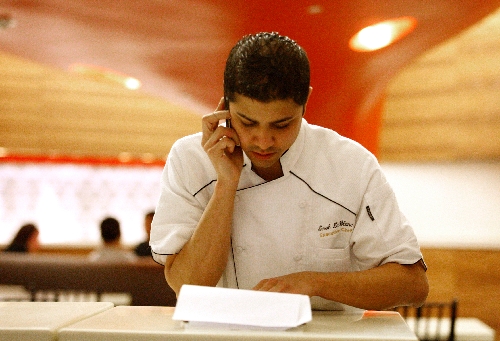
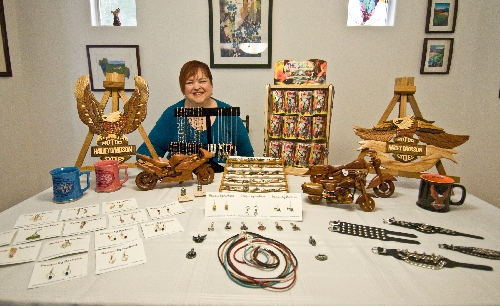
Although numerous economic forecasts offer little hope beyond the current troubled status quo, many entrepreneurs are still leaping into business, believing they can make it.
Diana Steenman, vice chairman of the local chapter of the business counseling organization SCORE, said the number of people walking in the door looking for help rose 10 percent last year and is much higher than it was during the boom year of 2007.
Part of this stems from SCORE seeking a higher profile. However, she said, the numbers also reflect how a tighter economy has changed the rules.
“More and more people realized that you have to do some planning now, on marketing and expenses,” she said.
Also, with more stringent bank lending standards, people need to rely more on their own savings, friends and family for initial funding.
A glut of office and retail space, and fixtures from previous businesses that failed, have gone a long way to lower startup costs. Horace Hughes said a deal on space and equipment helped enable his longtime dream of becoming his own boss.
Some people have made a virtue of necessity, such as Eric Ledbetter, who went on his own when the union jobs he long relied on vanished.
Statistics compiled by the Clark County Business License Department indicate renewed activity.
The 73,431 renewals during the fiscal 2010 that ended last June 30 was 7.7 percent higher than in the boom year of 2007. The number of applications hit the lowest level in four years at 11,996 in 2009. But 97 percent finished the process and received a license, compared to 74 percent in 2009.
Here are the stories of a handful people who have decided to buck the odds and become small-business owners.
LEDBETTER ELECTRIC
Reporting regularly to the International Brotherhood of Electrical Workers hiring hall translated into a good living for Eric Ledbetter for nearly 22 years.
But as the construction boom evaporated, so did the assignments. During a six-month stretch in 2010, paid work as an electrician had almost been relegated to nostalgia.
In August, he decided to go independent.
“It’s better than sitting at home and not having anything to do,” he said
He and his wife decided to allocate some of their savings — he did not say what amount — as seed money for Ledbetter Electric. If he burned through the amount, they agreed, the entrepreneurial experiment would end.
Working from the garage of his Henderson home, Ledbetter has so far managed to land enough work, particularly for residential clients and solar energy installations, that he has not needed to drain the fund.
Although he can tap his two decades of wiring experience, he had to start from scratch in searching for customers. Calling on previous contacts “is very much frowned upon,” he said, because it carries the appearance of an independent poaching union paychecks. However, his website promises to bring in IBEW members if he cannot do all the work himself.
So he has tried several avenues, such as Henderson Chamber of Commerce meetings and Google listings, to put his name out. But Google can also become a burden, he has found, because of its floating rate system that charges $20 a click sometimes and $200 other times, often changing without warning.
“It’s expensive, so you really have to watch it closely,” Ledbetter said. “The hard part of being on my own has been taking care of the marketing.”
Nevertheless, he has heard enough people say they will call him for jobs that he thinks he can get established in 2011.
“If even half of these promises happen, then things will be good,” he said. “In two months, I will be able to tell exactly how this will go.”
PAPA BURGERS
For more than 15 years, Horace Hughes had worked at fast-food outlets aiming not just to collect an hourly paycheck but to get a business education.
After starting as counter help at age 16, he moved into different kitchen jobs and eventually into management, interspersing his experience by reading about financial titans such as investor Warren Buffett. When a barbecue shop in a strip mall on West Owens Avenue closed a few months after it opened, its low rent and existing fixtures led Hughes and a partner to use it to start Papa Burgers in January 2010.
“I’ve always wanted my own business,” the 36-year-old Hughes said. “So when this opportunity came up, I went in headfirst with no hesitation at all.”
Despite his low starting costs, Hughes realized starting a business wouldn’t be easy.
“I’m surprised I’m still in business because of the demographics around here,” he said, of his West Las Vegas location. “The average income is not even $25,000 a year.”
He had to adjust along the way. The woman who had worked the counter daily has been put on call to reduce payroll. Hughes’ partner, Martel Shelton, will come in from the barber shop he owns to help during busy lunchtimes.
In June, Hughes analyzed sales patterns and found that nighttime sales were not covering the bills, so he decided to close a couple of hours earlier than the original 10 p.m.
Although cash flow now covers the expenses and lets Hughes pay himself every other month, he said his fiancée still needs to chip in for living expenses. But he is already imagining an expansion.
His first year has convinced him that a combination of not-so-fast fast food — he cooks only as orders come in and doesn’t own a heat lamp — and a menu that includes not just burgers and fries but also shrimp, breakfast items, salads and chicken will draw loyal patrons. He hopes to grow in measured steps, stay within his current kitchen’s limitations and not run up debt. He hopes that will help him land fresh financing and lead to more locations in a year or two.
“If we can do this well here, I know the product will sell in an area with better demographics,” he said.
I u2665 Burgers
When asked what lesson he learned from his first restaurant, which he closed after about one year, Errol LeBlanc immediately shoots back, “Never trust anybody.”
He said a landlord that did not deliver on promises, and lost through the small shopping center where LeBlanc’s R.E. Tapas was to foreclose, taught him to watch his back.
“In business, nobody is your friend,” he said. “As long as they get theirs, that’s all they care about.”
Yet he returned in December as the executive chef and general manager of I u2665 Burgers, leading the adrenaline-charged dash that ended in the Dec. 18 opening. This time, he is an employee of the Fine Concepts, which owns several other Las Vegas venues. But he already talks about working into an equity position and launching another tapas restaurant.
The setting has changed dramatically since his 2008 venture, from a nondescript mall east of the South Point to a corner of the Shoppes at Palazzo that formerly housed a high-priced rice-and-noodles restaurant. This time, he said, he can tap a deeper bank account and avoid having to drain his own savings or juggle invoices because the cash balance ran low.
“There are benefits to being backed by a big corporation,” he said.
It also meant moving out of his comfort zone of more classical cuisine training to something just about anybody can cook in the backyard.
“I had never sold a burger in my life, but this was a good opportunity,” he said, because Fine gave him wide latitude to design the menu.
Other business tactics, particularly holding a tight rein on spending, have carried over from LeBlanc’s R.E. Tapas days. All of the kitchen equipment except for the plates was reused from the previous tenant. When it came time to remove the old tables, which were glued and bolted to the floor, LeBlanc and a couple of Fine executives brought sledgehammers and axes and did the dirty work themselves.
DESIGNS BY DARLIENE
Darliene Howell already had the elements: a faint boredom with retirement, a knack for crafts and the desire for extra income.
But it wasn’t until May, after she’d seen a friend sell embroidery at biker shows, that she assembled everything into Designs by Darliene. Besides the jewelry she makes from crystals and semiprecious stones, Howell sells motorcycle-related novelties such as wooden replicas of different models and Harley-Davidson mugs.
“There are a lot of biker clubs in this area,” Howell said. “I don’t think we have really tapped into that much of it yet.”
Motorcycle novelties are hardly novel; Harley-Davidson, for example, markets hundreds of items through its website. The key to getting noticed, Howell said, is to scour gift shows that come to town, find biker-oriented items that no one else has, and offer those items for sale.
She has been hitting two or three shows a month to feature her jewelry. But even if her wares catch on with bikers, Howell doesn’t want making and selling them to become a full-time venture.
“Controlling the hours is part of the attraction,” she said.
For the past few years, she and two partners have run the online novelty retailer chunkebusiness.com. It carries self-described “whimsical fat-friendly gifts” based on caricatures of heavy-set people made into everything from napkin rings to boudoir accessories.
ADRODS
Rolling advertising has been a part of Southern Nevada business for years. In locals neighborhoods, cars painted or plastered with logos have long cruised the streets to promote businesses.
In one sense, partners Sean Mahoney and Jeff Graves just added a wrinkle to street advertising by draping ad wraps on classic cars, mainly from the ’50s and ’60s.
Their business plan departs sharply from convention. Instead of taking an idea and trying to hold down their initial investment, Mahoney and Graves spent heavily to create a physical asset base.
Those assets, a fleet of seven cars that cost an undisclosed amount exceeding $100,000, helped attract an outside investor by serving as something as an insurance policy in case the advertising doesn’t sell.
“These cars appreciate, they don’t depreciate, even if you drive them,” said Mahoney, who also owns his own ad agency. “They went up in value during the recession.”
The theory is that the cars, including a 1950 Ford F100 truck and a 1967 Cadillac convertible, can always be sold for at least a break-even price if they don’t earn their keep as ad vehicles. By contrast, a small retail shop that doesn’t make it would leave behind only inventory that might be liquidated for a small fraction of its book value.
The partners said they would consider buying other cars if clients specifically request them and commit to ad contracts.
“The good thing is that they are old and unique vehicles,” Mahoney said. “But the bad thing is that they are old and unique vehicles.”
For example, it can be difficult to find a mechanic who can work on a carburetor or engines that went out of production five decades ago. Chrome body strips might require an extensive search.
Mahoney, a self-proclaimed car fanatic, credits Graves, a former commercial real estate broker, with noticing that classic cars rolling down a street turned heads and had potential as advertising platforms.
Contact reporter Tim O’Reiley at
toreiley@lvbusinesspress.com or 702-387-5290.





